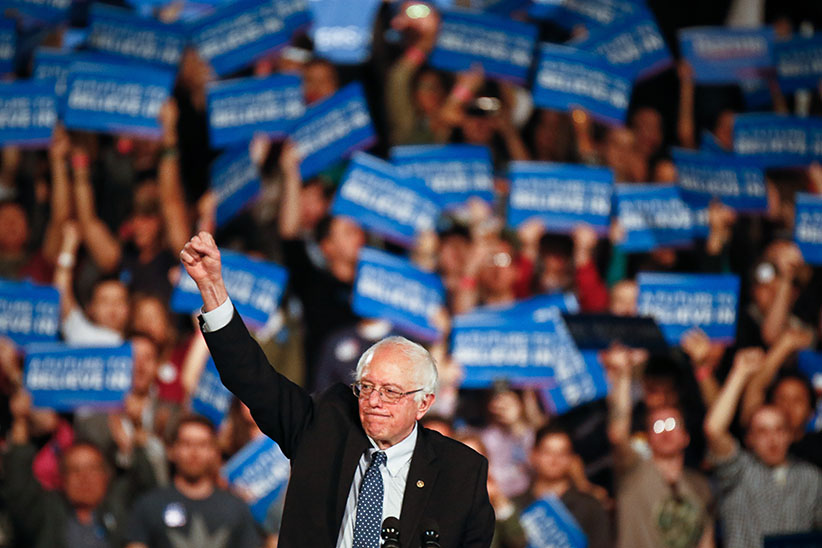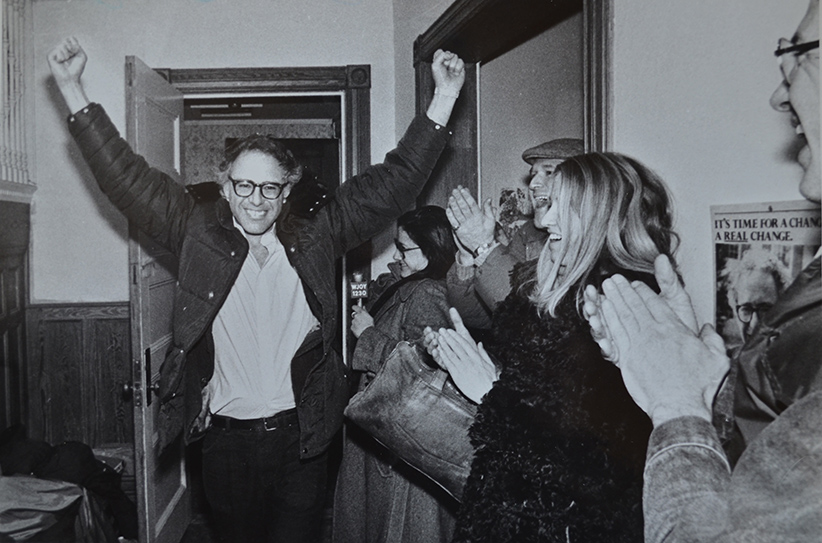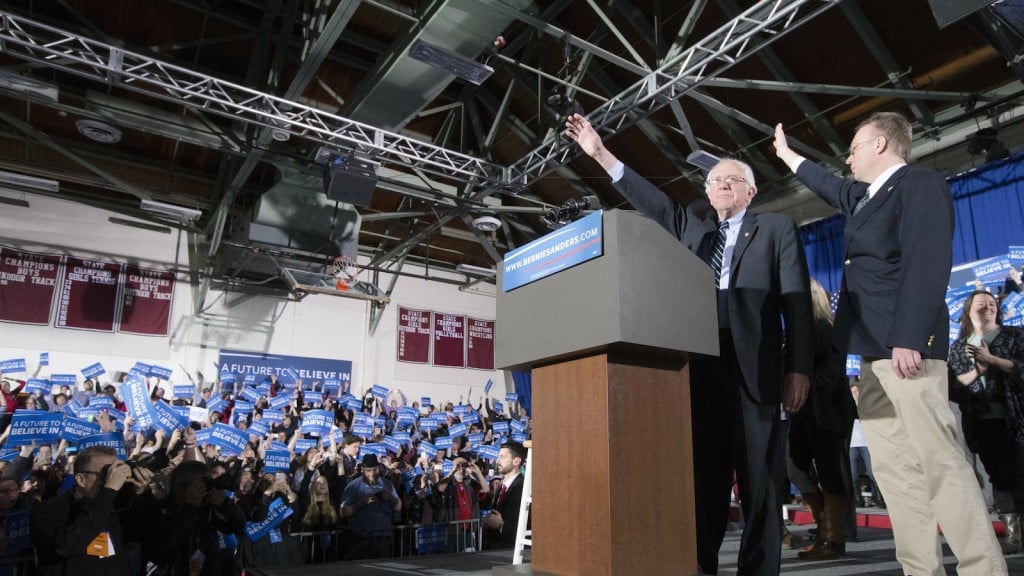Where Sanders was king: Heading to the heart of Bernie land
In Burlington, Vt., a fluke mayoral election turned a losing politician into a local hero—and a would-be president
DENVER, CO – FEBRUARY 13: Democratic Presidential candidate Bernie Sanders (D-VT) thanks supporters after speaking at a rally on February 13, 2016 in Denver, Colorado. Sanders spoke about keeping big money out of politics, climate change and making college affordable and drew an overflow crowd. (Marc Piscotty/Getty Images)
Share

The hopeful little utopia that Bernie Sanders built hugs the eastern bank of Lake Champlain, which may be the only bank he approves of.
To the north of the littoral, liberal city of Burlington, Vt., is the Quebec frontier, less than an hour’s drive away. To the south is the fairy-tale Vermont of Robert Frost and Norman Rockwell. But the 21st century also has painted a less poetic portrait here of heroin, homelessness and rural isolation.
For U.S. Sen. Bernie Sanders, democratic socialist candidate for the U.S. presidency, two roads diverged in a Brooklyn ’hood more than 50 years ago. One might have ended in a conventional career in New York City, perhaps as a teacher or trade unionist, shouting insults at the billionaire class from the sidewalk beneath Trump Tower. (At 74, he’d be husbanding his pension by now at some Century Village in Florida, or taking in the sun on the Coney Island boardwalk.) Instead, the path he chose in the late 1960s led to student activism at the University of Chicago and then to the Green Mountain State, verdant destination for a caste of counterculturists who aspired to a more sharing, caring life.
As he battles Hillary Clinton for the Democratic nomination—having demolished her supposed inevitability last week in the New Hampshire primary, even among female voters of all ages—Sanders presents himself as the enemy of rapacious capitalism and as the forerunner of an epochal upheaval of the American political compact.
Related: A weekend with Bernie
“Let’s start a political revolution today!” his handouts cry, yet Sanders has been a career politician for more than 43 years, standing for election 21 times in various local, state, and federal contests and winning 14 of them, including four two-year terms as the progressive mayor of Burlington in the 1980s. His tenure as a member of Congress from Vermont has lasted three times longer than Clinton’s eight years as a senator from New York. Though nominally seated in the Capitol as an Independent, he has voted with the Democrats more than 90 per cent of the time, siding with the congressional left on nearly every issue except for gun control.
It is in Burlington, population 42,000, where Bernie’s Subaru Outback is parked in the driveway of a handsome yet not ostentatious home on Van Patten Parkway, while an unmarked SUV staffed by two unsmiling plainclothesmen idles on the avenue outside. (“Secret Service?” “Yup.”) It is here that Sanders’s portrait adorns a civic mural that also features Vermont’s two previous presidents: Chester A. Arthur, and Calvin Coolidge.
It is here that you can see quotations from Nelson Mandela posted in the airport, watch Progressives Today on television, and get locally sourced organic cheddar curds on your poutine. But it also is here that you can visit a drop-in centre that aids thousands of recovering drug addicts every month, and view the ravages of hundreds of Vermont winters on some of the oldest housing stock in the United States.
So it is to Burlington that a reporter comes to discover what eight years of Sanderista government accomplished in the largest city of a tiny state, and what might transpire should the most popular and successful socialist in American history find himself in the Oval Office.
“When Bernie became mayor,” says Gretchen Bailey, Sanders’s deputy at Burlington City Hall and later his congressional aide in Washington, “it was a shock to the local establishment that he won. At that point, I’m not sure that Bernie even knew himself what he was aspiring to, except he knew that poor people in town weren’t getting anywhere, and he wanted to help them.
“In the city, it was, ‘fix my sidewalk.’ It was, ‘I can’t pay my rent.’ Whatever Bernie’s vision was on a higher level, he wanted this stuff fixed. Without Bernie, this city would be so far behind where it is today,” says Bailey. “The waterfront, the parks: they wouldn’t be there. The people wouldn’t care so much.”

Sanders had swept into office in 1981 with a less-than-commanding mandate for radical change: a 10-vote plurality. A split in the local Democratic monolith occurred when the owner of a popular Italian restaurant named Dickie Bove had a falling-out with the sitting mayor and decided to run against him. Throw in the lack of any Republican opposition and Sanders, who had been walloped badly in previous runs for governor of Vermont (twice) and U.S. senator (twice), found himself elected.
“We worked our fannies off for people,” Gary De Carolis, a three-term city councilman from Burlington’s long-derelict Old North End, remembers. “Bernie brought in bright people, energetic people. By holding true to his values, he probably learned more and more about what it was like to not have health insurance, to not have higher education, to not have the things that other people take for granted.”
De Carolis is the executive director of the Turning Point Center, a non-profit, peer-run recovery agency that serves 3,000 people every month. “When he would have town meetings,” De Carolis says, “I was taken aback by the reception he got from people who were so far down on the totem pole that they couldn’t believe that a politician would actually listen to them and care what they had to say. We all wanted a different America, that’s for sure. But Bernie understood that he could only talk about Nicaragua if he got the potholes fixed first.”
Sanders did more than talk about Nicaragua—defiantly, he travelled there at the height of the Ronald Reagan presidency to commune with the Sandinista regime as the “head” of a two-man American delegation. He welcomed such leftist paragons as Noam Chomsky, Allen Ginsberg, and Abbie Hoffman to Burlington, not to mention the Leningrad Youth Choir. When Sanders married Jane O’Meara Driscoll, the head of the city’s youth office, in 1988, they honeymooned in the Union of Soviet Socialist Republics.
But as mayor, Sanders never shifted his focus away from the lower- and middle-class citizens of Burlington. “I remember a letter to the editor written by an older man that said, ‘I don’t know anything about this socialism, but Sanders is doing a good job repaving the streets,’ ” Bernie wrote in his 1997 autobiography, Outsider in the House. (The book was recently reissued with the title Outsider in the White House.) “My administration never lost sight of the fact that, while broadening the scope of city government and developing new policies were important and satisfying, we could never forget about taking care of the basics. And in this area, we out-Republicaned the Republicans.”
“Bernie’s prime objective was to try to fight against the displacement of poor people,” recalls Steve Norman, a legal-aid attorney and fair-housing advocate who was Bernie’s shortstop on an amateur baseball team. (When Sanders, a left-handed pitcher, fought for, and won, a minor-league franchise for Burlington, they were, of course, the Reds.) Norman cites such Sanders-era initiatives as an inclusionary zoning ordinance that required developers to offer a percentage of affordable units, and the non-profit Burlington Community Land Trust, as concrete relics of the mayor’s power-to-the-people rhetoric.
Three decades after Sanders voluntarily gave up the mayoralty to run for the U.S. Congress, the Old North End of Burlington is still no Beverly Hills. But the stringent regime of renovation and inspection that Sanders enforced as mayor has been so successful, Norman says, that the fire department complains it cannot train its new recruits because there aren’t enough real blazes to practise on.
“You can see Bernie’s legacy in the houses of the Old North End,” says Jane Knodell, president of the current Burlington city council, who has known Sanders for more than 25 years. “Without Bernie, you’d see people in a lot worse shape than they are today. When people have a secure, affordable roof over their heads, they can get better jobs, keep their cars running, and get a better education. It all starts with housing, and Bernie understood that.”
“You have to look beyond the physical legacy,” says Dylan Kelley, the 29-year-old marketing manager of the Peace and Justice Center down at the Champlain shore. “People my age are just scraping by, and only Bernie says ‘Enough is enough!’ ”
Yet all of this—Burlington’s abundance of affordable housing and its tenant-rights advocacy, its accessible lakefront, its vibrant arts and youth-activities infrastructure, and the surging candidacy of its champion in the presidential campaign—stems from a 10-vote victory, 35 years ago. “It’s all thanks to Dickie Bove!” laughs Knodell. (Bove died last week.)

“Bernie ran for everything and he lost,” recalls Antonio (Tony) Pomerleau, one of Burlington’s wealthiest developers and most generous philanthropists, then and now. “He ran against my nephew Pat Leahy for the Senate, and he lost. He ran for governor, and he lost. He ran for dogcatcher, and he lost. All of a sudden he comes to Burlington and he runs for mayor. So I took Paquette—he was the mayor back then—I took him out for lunch and I said, ‘What about this Sanders?’ And Paquette says, ‘I’ll win by 70 per cent.’ ”
Pomerleau is regaling a visitor while lounging in the basement of his opulent home overlooking Lake Champlain and chewing on slabs of pepperoni that seem rather large for a man who is 98 years old. “So Sanders won by 10 votes,” he continues. “The next morning, I knocked on his door. When he saw me, he nearly passed out. I said, ‘Bernie, you may be the mayor, but it’s still my town.’ ”
Pomerleau, Burlington’s one-man one per cent, also had a vision for his city—a lakeshore lined with high-rises full of affordable apartments; affordable, that is, if you were as rich as Pomerleau. (Burlington’s Donald Trump, it should be noted, wasn’t always so well-heeled. “At one time I was poorer than Sanders,” he declares. He started out as a window-dresser and ended up owning shopping malls and giving millions to charity.)
“It was Tony’s disastrous high-rise waterfront condominium development project that I had campaigned against in 1981,” Sanders wrote in Outsider. But that enmity was only in his first term. By 1983, the tycoon and the socialist had formed an unlikely, but long-lasting, alliance. In place of Pomerleau’s high-rent condos, Sanders erected a public boathouse, a public park, and a public bike trail, and turned Burlington’s face to the water.
“I was going to do the whole development myself,” Pomerleau recalls. “But they all wanted free canoes and free hot dogs, so I said ‘Forget it,’ and Bernie took it over.”
“When you listen to his campaign speeches,” he is asked, “and he promises free college and free health care, isn’t that the same thing as free canoes and free hot dogs?”
“I won’t answer that,” Pomerleau retorts. Then he does anyway. “Of course if somebody makes more money, they should pay more taxes. Somebody’s got to pay! If I told you how much I pay in taxes, you’d fall off your chair.”
The 98-year-old stretches for another chunk of sausage. “Bernie says that if he’s elected, he’s going to make me his vice-president,” he announces. “He says I’m the only one who’s going to live longer than he will.”
“So I’ll see you in Washington on Inauguration Day,” his guest needles.
“I’ll make you a bet,” says Pomerleau. “I’ll be closer to him than you are.”
Depending on what happens this Saturday in Nevada, next Saturday in South Carolina, and in the Super Tuesday states that will hold their Democratic primaries on March 1, a Sanders presidency may be closer than anyone—including Sanders—ever dreamed.
“He’s definitely the same guy,” says Knodell. “He’s authentic. He is very credible when he says to working people, ‘I understand your problems and I will work to fix them.’ This guy knows constituent service. I think that he under-predicted how resonant his message would be. I think he is blown away.”
“Do you really think that he can make a political revolution in this country?” the council chair is asked in the tidy little city by the big, cold lake.
“He made one here,” she replies.